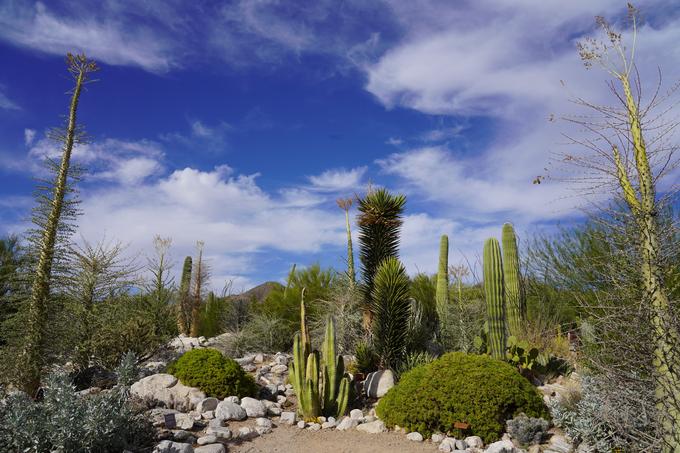Tucson Botanical Gardens is a 5.5-acre botanical garden complex that serves as an urban garden oasis and nature education facility. The current Tucson Botanical Gardens complex represents the convergence of two notable horticultural resources. In 1964, horticulturalist Harrison G. Yocum opened his personal collections of palm, cacti, and other plant specimens to the public on the grounds of his North Jefferson Street home.
History
Throughout the 1960s, Yocum's garden collection grew into a nonprofit organization with more than 100 charter members, prompting a move to Randolph Park's greenhouse facility.
With the success of the Randolph Park location, a larger location became necessary, and in 1974, the organization acquired the historic Porter Family property. Originally the personal residence of local landscapers and philanthropists Rutger and Bernice Porter, the house was the home of Desert Gardens Nursery until 1958. After her husband's death, Bernice Porter donated the facility to the City of Tucson for use as a public garden, and in 1974, the property was designated for use as a horticultural center. The merger of the Porter house with Tucson Botanical Gardens kept the original building and grounds, preserving the legacy of the Porter family and incorporating elements of their history into its gardens and exhibits.
Permanent Exhibits and Attractions
The complex comprises 17 individual themed gardens, along with a cafe, gift shop, educational center, and outdoor pavilion.
The Porter house building has been renovated into a library and administrative office facility, retaining much of the original look and feel of its use as a family home. Several areas of the complex also incorporate the original layout of the Porter house's grounds, including the Reception Garden, which converted the Porters' sun porch space into an event area with a raised stage, and Edna's Shed, named for a family friend. The herb garden is also a continuation of the Porters' original herb garden, cultivating a variety of fragrant, culinary, and medicinal specimens.
Plant life native to the southwestern United States is showcased in the wildflower garden, which features seasonal blooms of Mexican gold poppy, desert marigold, chocolate flower, and Penstemon, while the cactus and succulent garden displays cacti both native to the area and grown around the world. A number of gardens also focus on historical and cultural gardening styles of the area, including several gardens honoring Tucson's diverse populations. A Native American crops garden and the adjoining Plants of the Tohono O'odham Path pay homage to the crops and wildlife cultivated by the Sonoran Desert's indigenous people, and the Nuestro Jardin contains plants commonly displayed in Mexican-American barrio gardens. Additionally, a historical garden chronicles tree and shrub varieties popular in local gardening styles of the 1930s, 1940s, and 1950s.
A butterfly greenhouse is home to the seasonal Butterfly Magic exhibit, along with a large collection of tropical plants. Butterflies and birds also populate the butterfly garden, the Aloe Alley pathway, and the Backyard Bird Garden, which educates on ways to attract birds to personal gardens. Other gardens include a shade garden, which features native plants that thrive in shady areas, a quiet reflective Zen garden, a children's discovery garden, and an iris garden, which blooms with a wide variety of colorful bearded iris in spring.
Visitors can also dine on site at the Café Botanica, which features homemade cuisine by local caterer Kristine Jensen, owner of the Gallery of Food. The cafe serves dishes inspired by culinary traditions of the Sonoran Desert area, utilizing sustainable ingredients from a variety of local vendors.
Ongoing Programs and Education
As a natural educational resource for the Tucson area, the Tucson Botanical Gardens are committed to providing programming that emphasizes the aesthetic, scientific, and cultural aspects of horticulture. The facility's Horticultural Therapy program is one of the country's longest-running garden-based programs, started in 1983 as an outreach program to bring hands-on gardening activities to area nursing homes, assisted living facilities, and special needs educational programs. The program is run by graduates of the gardens' docent training program, which offers interested area residents the opportunity to lead guided tours and assist with facility programming. A number of community classes are also presented by docents and educators, including a 6-week DIY Desert Design course, which assists participants in creating successful gardens in the region's arid climate.
Since 2015, the facility has hosted an increasing number of nationally recognized touring exhibits, including the New York Botanical Gardens' acclaimed Frida Kahlo: Art, Garden, Life exhibit. Other popular events include the Summer Oasis series, which presents weekly themed afterhours events from June through September, and the Dog Days of Summer, which allows visitors to bring pets into the park for an additional fee.
2150 N Alvernon Way, Tucson, AZ 85712, Phone: 520-326-9686





